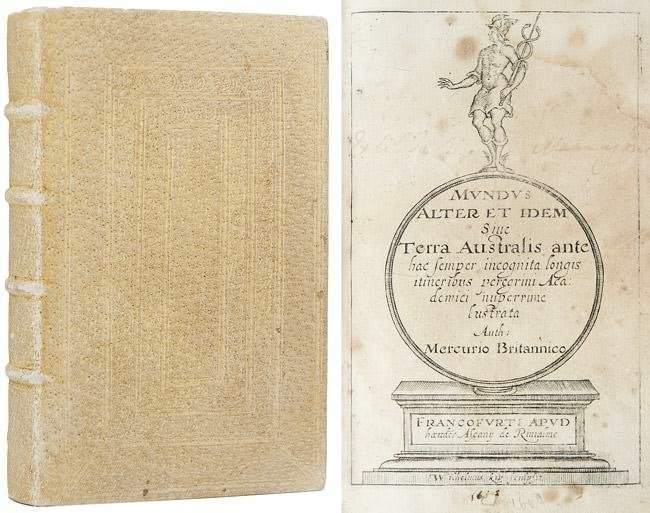
Lote
Livro
Hall, Joseph
Mundus alter et idem sive terra australis ante hac semper incognita longis itineribus peregrini academici lustrata autho. Mercurio Britanico. Published by Frankfurt: apud haeredes Ascanii de Rinialme - 1607-first-state engraved title-page, 5 folding engraved plates (all first edition), the text a mixed edition (two gatherings from the second printing - see below), somewhat soiled and browned, a few outer edges slightly frayed, title slightly abraded, some contemporary manuscript notes, ownership inscriptions to title and flyleaf and Macclesfield embossment to first two leaves, pp. [xvi], 224, 8vo, original limp vellum, somewhat soiled, ties lost, stitching loosening, Shirburn Castle bookplate, preserved in a clamshell morocco-backed box, sound Joseph Hall (1574-1656) was bishop of Exeter and later Norwich, but in his early years was an important English satirist - his work includes "the first collection of formal verse satires on the Latin model to be published in England" and the introduction of the Theophrastan "character" to English literature (ODNB). This anonymously published work, probably written during Hall?s Cambridge days, is "the first English dystopia" (McMullan, "Politics of Unease", p. 236) as well as an important influence on Swift‘s "Gulliver‘s Travels". It seems to have been only formally attributed to Hall in 1674, although Milton had attacked the work and Hall himself at the time for being devoid of the moral message necessary to satire. In the text, the fictional traveller "Mercurius Britannicus" visits four nations with telling Latinesque names: Crapulia, Viraginia, Moronia, and Lavernia (respectively, gluttony, shrewish women, folly, and deceit); the index glosses the various placenames within each region to emphasise the joke. In this copy, an early owner has then written in further English "translations" for many of the entries in the index (e.g. "Scioccia, pr. ab Ital. Sciocco, fatuus", annotated as "Doltchester") - and these are not the same as those given in the first printed English translation of 1609. The maps illustrate the imaginary "Australis" (Antarctic) continent, and two give details of the Americas as well (hence its inclusion in Church and Sabin). The publication history of the text is somewhat complicated - it was first published in London around 1605, but with a title-page bearing a Frankfurt imprint. It was then reprinted in 1607 in Hanau, with a different title-page. But a number of copies, like this one, are primarily the first edition but with two gatherings - the prelims and D - from the second printing. Evidence that this was done before publication comes from the presence of a corrected reading in the same hand in the prelims of several such "mixed" copies, as well as from the wholly original state of this copy. Wands conjectures ("Early Printing History of Joseph Hall‘s Mundus Alter et Idem", PBSA 74) that signature D was damaged or lost during the transit of sets of sheets to the Frankfurt Book Fair in 1607, and the loss made up from the recently-printed second edition. If so, this copy must have been almost immediately re-imported to England, since all signs point to early English provenance. Although ESTC lists 8 copies of this mixed edition in the UK, these are spread across only three locations: BL, Cambridge (2) and Oxford (5). The unmixed first edition is also oddly concentrated, with ESTC giving 14 UK copies (plus two in Dublin), these comprising 7 in Cambridge, 3 in Oxford, and 4 in cathedral libraries. (ESTC S103674; Sabin 29819; Church II 54.

Novidades do Leilão de Arte!
Seja o primeiro a receber a agenda dos próximos leilões, exposições e novidades de acervo.
Ao assinar, você concorda com a nossa política de privacidade.